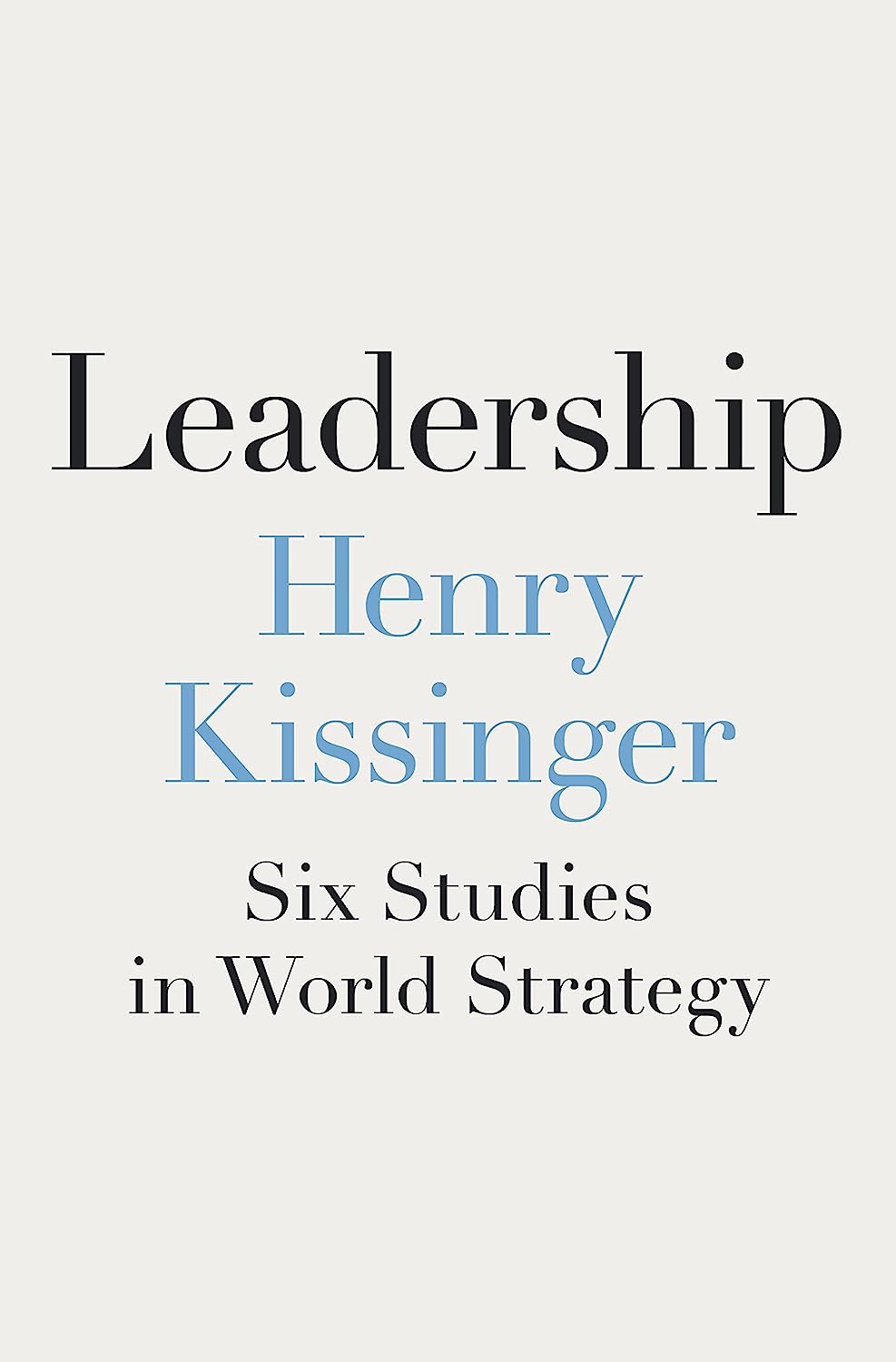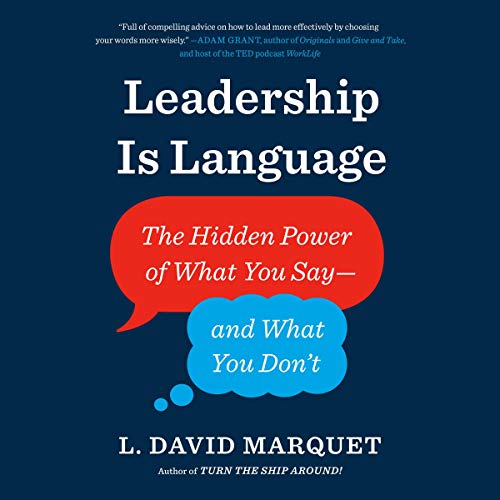Leadership: Six Studies in World Strategy Review
Introduction
Welcome to the review of “Leadership: Six Studies in World Strategy”! In this book, Henry Kissinger delves into the lives and leadership styles of six influential figures of the 20th century, providing valuable insights into the art of leadership and statecraft. Kissinger, a renowned statesman himself, offers an in-depth analysis of what made these leaders exceptional and how they achieved greatness in their respective countries.
The Power of Leadership
Through personal anecdotes and meticulous research, Kissinger explores the accomplishments, challenges, and personalities of these exceptional leaders. He highlights their ability to inspire, sustain a long-term vision, and resist being influenced by prevailing moods or opinions. Kissinger emphasizes the importance of historical awareness and the ability to navigate through tragedy in order to lead effectively.
Beyond Traditional Statecraft
What sets this book apart is Kissinger’s departure from his traditional approach to statecraft, as he examines leadership styles different from his own. He acknowledges the strategy of equilibrium, for which he is renowned, but also recognizes and admires other approaches, such as Margaret Thatcher’s strategy of conviction. This willingness to explore alternative ways of leadership showcases Kissinger’s open-mindedness and ability to embrace novelty even at the age of 99.
Nixon’s Complex Portrait
While Kissinger provides fascinating insights into the lives of the other five leaders studied in the book, his portrayal of Richard Nixon is somewhat disappointing. Despite his close relationship with Nixon, Kissinger’s essay lacks the depth and detail found in his other works. Questions arise about the honesty and completeness of this particular section, especially regarding Nixon’s pursuit of an anti-ballistic missile system and the subsequent arms race that followed.
Background
Leadership in World Strategy
If you love reading books on history, then “Leadership: Six Studies in World Strategy” by Dr. Kissinger is a must-read for you. Dr. Kissinger, known for his brilliant insights, offers a collection of essays that delve into the lives of six world leaders who shaped the twentieth century. Through his unique perspective and personal experiences with these leaders, he provides deep insights into their thinking and actions.
Overview of the Six Studies
Dr. Kissinger’s book takes you on a journey through the lives of Adenauer, DeGaule, Nixon, Thatcher, Lee Kwan Yew, and Sadat, highlighting their exceptional leadership qualities. Each chapter presents a study of one leader, examining their accomplishments, the challenges they overcame, and their distinctive personalities.
The book doesn’t follow a chronological order, starting with Adenauer and ending with Thatcher. While some may find the discussion on Adenauer less compelling, it provides valuable information and ideas seldom discussed elsewhere. From there, the book becomes a true tour de force, captivating readers with its engaging narratives and thought-provoking analysis.
With his unparalleled knowledge and firsthand experiences, Dr. Kissinger provides a comprehensive and enlightening perspective on these influential figures. By delving into their lives, he allows you to witness their courage, determination, and even their vulnerability.
“Leadership: Six Studies in World Strategy” is not just a book to be read hastily; it is a treasure trove to be savored. Its valuable insights and lessons are sure to leave a lasting impact on your understanding of leadership in the world of strategy.
Leadership Profiles
Konrad Adenauer (1876-1967)
Konrad Adenauer, the first post-war Chancellor of the Federal Republic of Germany, experienced the German state’s tumultuous transitions under different political regimes. Despite the nation’s self-destruction and disintegration, Adenauer played a significant role in rebuilding Germany and establishing it as a full partner in Europe and the Atlantic Alliance. His leadership was characterized by resilience and determination, guiding his country through the aftermath of World War II.
Charles de Gaulle (1890-1970)
Charles de Gaulle, known for his poetic sensibilities and commitment to French sovereignty, kept alive the idea of a sovereign France during World War II. Reinstating the dignity of his country, de Gaulle’s leadership focused on preserving France’s independence and restoring its status as a great nation. His unwavering belief in France’s potential and his dedication to self-mastery shaped his leadership approach.
Richard Nixon (1913-1994)
Richard Nixon, with his nuanced foreign policy views, employed disciplined application of American power and national purpose during his presidency. Despite his insecurities and self-doubts, Nixon’s leadership marked a significant milestone with the historic opening of China. He understood the importance of leveraging American influence and making calculated decisions to advance national interests.
Anwar Sadat (1918-1981)
Anwar Sadat, the President of Egypt, brought forth a philosophical and moral vision that revolutionized the region. He aimed to achieve Egypt’s freedom through independence and sought to foster a dialogue between Jews and Arabs, intertwining their histories. Sadat’s personal reflections and interior transformations shaped his leadership, leading Egypt with a groundbreaking approach that redefined the Middle East.
Lee Kuan Yew (1923-2015)
Lee Kuan Yew, the first Prime Minister of Singapore, implemented strict enforcement of laws to combat corruption and achieve his vision of a prosperous nation. A pragmatist guided by the realities of the world, Lee embraced market economics and actively sought talented individuals from around the globe. His leadership transformed Singapore into one of the least corrupt countries worldwide, highlighting his commitment to maintaining law and order.
Margaret Thatcher (1925-2013)
Margaret Thatcher, raised in modest circumstances, became an influential figure in British politics. Known for her staunch advocacy of self-determination and sovereignty, Thatcher restored England’s economy and its sense of dignity and self-respect. Her leadership emphasized the importance of citizens choosing their own governance while supporting the responsibility of states to exercise sovereignty.
These six leaders showcased their unique approaches to governance and the ability to adapt to the challenges of their time. Their resilience, boldness, and commitment to their countries’ interests serve as exemplary models of leadership in the modern world. Whether it was rebuilding nations, restoring dignity, or transforming economies, they left a lasting impact on the history of their respective countries and the world. By studying their profiles, you can gain valuable insights into the qualities necessary for effective leadership in today’s complex global landscape.
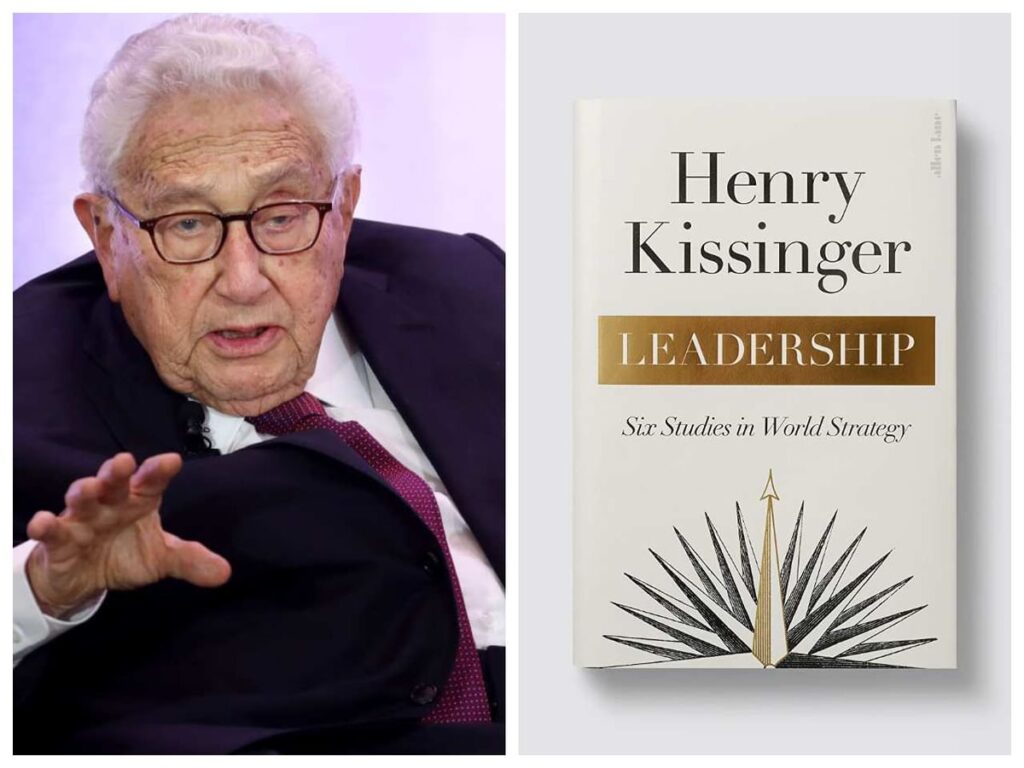
This image is property of images.news9live.com.
Insights and Analysis
Examining Leadership Styles
“Leadership: Six Studies in World Strategy” by Henry Kissinger offers a comprehensive examination of the leadership styles of six influential world leaders from the post-WWII period. Kissinger delves into the lives of Konrad Adenauer, Charles de Gaulle, Richard Nixon, Anwar Sadat, Lee Kuan Yew, and Margaret Thatcher, providing valuable insights into their unique approaches to leadership.
Implications for Statecraft
Each leader faced distinct challenges during their tenure, and Kissinger explores how their leadership styles shaped their countries’ strategies and statecraft. From Adenauer’s efforts to unify a broken Germany and Europe, to de Gaulle’s navigation of political disenfranchisement and the dissolution of the empire, the book highlights the profound impact that effective leadership can have on a nation’s trajectory.
Quotes and Examples
Kissinger’s study is filled with quotes and examples that offer a deeper understanding of each leader’s character and decision-making process. For instance, Nixon’s geopolitical acumen and ability to distill complex issues into core principles are commended, while Sadat’s principled pursuit of peace in the Middle East demonstrates his unwavering commitment to stability.
The book also explores Lee Kuan Yew’s utilitarian principles and pragmatism in transforming Singapore into a world-class city, as well as Thatcher’s conviction and strategic handling of challenges like the Falklands conflict. Through these varied examples, Kissinger emphasizes the importance of strong leadership in shaping the trajectory of nations.
“Leadership: Six Studies in World Strategy” offers valuable insights into the leadership styles of six influential world leaders. Kissinger’s lucid writing and firsthand experiences with these leaders make the book an enjoyable and informative read. By examining their unique approaches to leadership, Kissinger reminds us of the enduring qualities necessary to guide nations through challenging times and leave a lasting impact on the world.
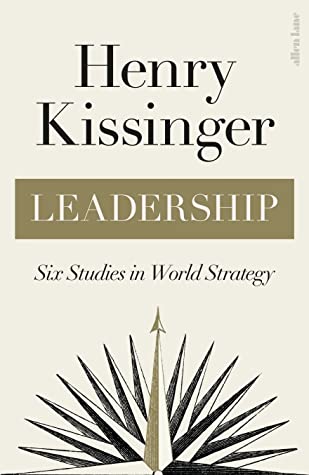
This image is property of i.gr-assets.com.
Critique and Discussion
Optimism and Global Challenges
In “Leadership: Six Studies in World Strategy,” Henry Kissinger offers a unique and insightful perspective on six influential world leaders of the 20th century. His essays provide a deep understanding of these leaders’ thinking and actions, showcasing Kissinger’s keen insight and masterful storytelling.
One notable aspect of this book is Kissinger’s departure from his traditional views on statecraft and his admiration for different leadership styles. He delves into the strategies employed by figures such as Margaret Thatcher, whom he praises for her conviction. This departure from his own recognized approach adds novelty to his work, even at the age of 99. It is a testament to his open-mindedness and willingness to embrace alternative perspectives.
However, the book does have a minor shortcoming. Kissinger’s portrayal of Richard Nixon, a figure with whom he had a close relationship, lacks the depth and detail found in his previous works. While it provides a neat summary of their collaboration, it fails to offer the same level of insight into Nixon’s personality and character. Despite this, Kissinger’s portrayal remains respectful and positive, highlighting Nixon’s wisdom, decisiveness, and courage.
The Role of Global Governance
One of the key themes explored by Kissinger in “Leadership: Six Studies in World Strategy” is the role of global governance in addressing the challenges facing the world today. Kissinger’s optimism regarding a balance of sovereign states, each exemplifying the virtues of their nations, is commendable. However, some may argue that more is required to ensure the survival of the human species.
Given the rapid advancement of mass-killing technologies, climate change, and the influence of social media and AI, Kissinger’s vision of sovereign states may not guarantee the desired outcomes. Critics argue that a global governance superstructure, enforcing globally essential measures for civilizational survival, is imperative. This viewpoint suggests that a collective effort beyond national boundaries is necessary to navigate these complex challenges.
Alternative Perspectives
While Kissinger offers valuable insights into these world leaders, some readers may find themselves questioning certain aspects of his analysis. For instance, in his essay on Nixon, Kissinger characterizes Nixon’s pursuit of anti-ballistic missile (ABM) systems as a thoughtful precursor to President Reagan’s deployment plans. However, this interpretation overlooks contrasting views held by others, including Kissinger himself in the past.
Moreover, some readers may find a discrepancy between Kissinger’s portrayal of Nixon’s leadership in “Leadership: Six Studies in World Strategy” and Martin Indyk’s comprehensive study, “Master of the Game.” Indyk’s work, informed by Kissinger’s firsthand accounts, portrays Nixon as heavily reliant on Kissinger’s advice and direction, suggesting a less confident and self-assured leader.
Despite these inconsistencies, “Leadership: Six Studies in World Strategy” remains a compelling and thought-provoking read. Kissinger’s brilliance, negotiation skills, and ability to offer deep insights make this book a valuable resource for political leaders, aspiring leaders, and students of statecraft. It reminds us of the transformative power of great leadership in shaping history and confronting challenging times.
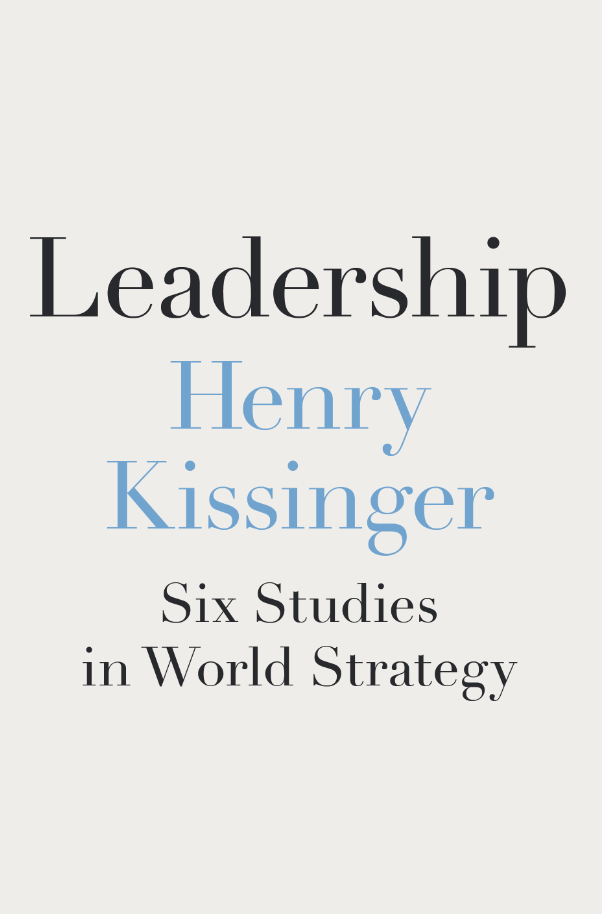
This image is property of www.internationalaffairs.org.au.
Pros and Cons
Engaging and Informative Read
“Leadership: Six Studies in World Strategy” by Secretary Kissinger provides a compelling and informative account of six renowned leaders. The book delves into the accomplishments, challenges, and personalities of Charles deGaulle, Nixon, Thatcher, Lee Kwan Yew, Sadat, and Adenauer. Kissinger’s personal insights and experiences with these leaders make for an engaging and captivating narrative.
Unique Perspectives on Leadership
One of the standout features of this book is the unique perspectives it offers on leadership. Kissinger’s in-depth analysis of each leader’s strategies and approaches provides valuable insights into their successes and the obstacles they had to overcome. The stories shared within the book emphasize the crucial importance of visionary and courageous leaders who make decisions that benefit their countries.
Uncovered Historical Gems
For those seeking to delve into a lesser-explored period of history, this book is a treasure trove of information. The author’s meticulous research and knowledge shine through as he uncovers lesser-known facts and details about these leaders. In particular, Lee Kwan Yew’s transformation of Singapore proves to be a fascinating and enlightening exploration.
Timeless Wisdom for Current Leaders
While reading this book, you can’t help but long for leaders with the qualities exhibited by the figures within its pages. Kissinger’s insightful analysis and the lessons derived from these six leaders serve as valuable guidance for current and future leaders. The book prompts reflection on the lack of leadership displayed by many present-day politicians, leaving a desire for leaders who possess vision, courage, and dedication.
Final Thoughts
“Leadership: Six Studies in World Strategy” paints a vivid picture of exceptional leadership and offers inspiration and lessons for leaders in any field. Secretary Kissinger’s expertise and engaging writing style make this book a must-read for anyone interested in history, politics, and successful leadership. Prepare to be inspired and intrigued as you journey through the pages of this thought-provoking masterpiece.
FAQs
What is “Leadership: Six Studies in World Strategy”?
“Leadership: Six Studies in World Strategy” is a book written by Dr. Henry Kissinger, providing an in-depth exploration of the leadership qualities and strategies of six influential figures in world history. Through detailed analysis and insights, Dr. Kissinger delves into the leadership styles and decision-making processes of great leaders such as Charles de Gaulle, Franklin D. Roosevelt, and Otto von Bismarck, among others.
Why should I read this book?
If you are interested in gaining a deeper understanding of leadership and its impact on world events, this book is a must-read. Dr. Kissinger’s extensive knowledge and firsthand experiences with these leaders offer unique perspectives that can broaden your understanding of effective leadership principles and their application in different historical contexts.
What can I expect from reading this book?
By reading “Leadership: Six Studies in World Strategy,” you can expect to gain valuable insights into the qualities that define exceptional leaders. Dr. Kissinger’s engaging writing style and attention to detail allow you to immerse yourself in the historical accounts and contemplate the lessons to be learned from these notable figures. Whether you are a student of history, a leadership aspirant, or simply interested in the subject matter, this book provides a thought-provoking exploration of leadership in a global context.
Can this book be beneficial for current leaders?
Absolutely. “Leadership: Six Studies in World Strategy” offers lessons and perspectives that can be applicable to leaders from all fields and industries. It serves as a reminder of the qualities and characteristics that are crucial for effective leadership, such as vision, resilience, and a sense of history. By studying the experiences of past leaders, current leaders can gain inspiration and learn from their successes and challenges.
Is this book easy to read?
While this book is not a “quick read,” it is incredibly insightful and thought-provoking. To fully appreciate the depth of knowledge and wisdom contained within, it is recommended to read it thoughtfully. This allows you to savor the insights and lessons found within each chapter, making the reading experience all the more rewarding. So, take your time, delve into each story, and let Dr. Kissinger’s brilliant analysis guide you through the pages.
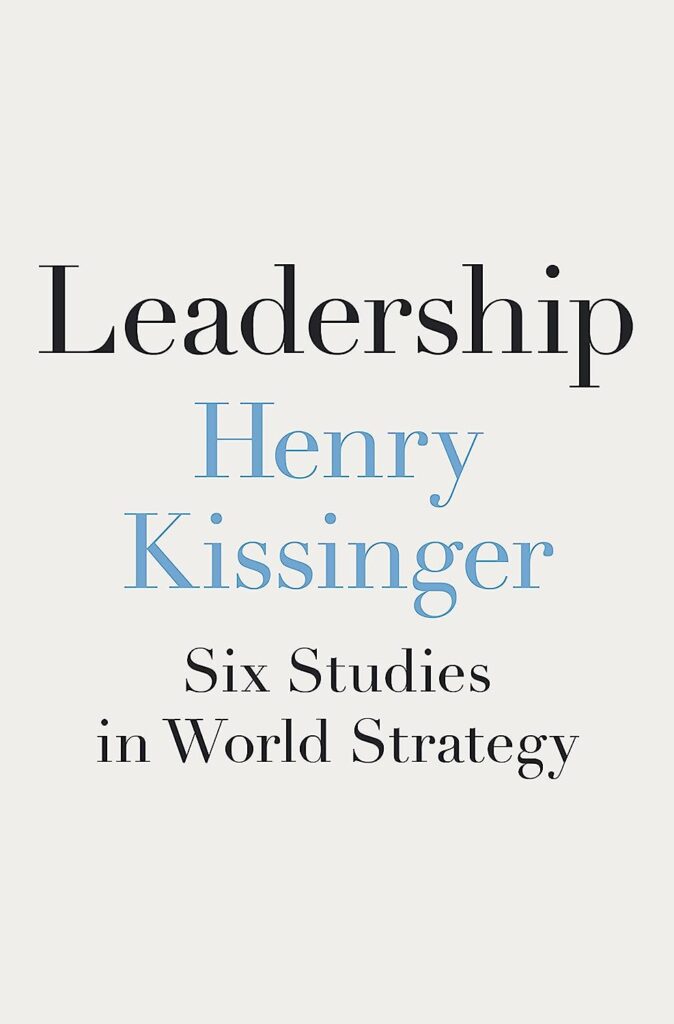
This image is property of Amazon.com.
Conclusion
Summary of Leadership Profiles
In “Leadership: Six Studies in World Strategy,” Secretary Kissinger offers a comprehensive analysis of six influential leaders: Adenauer, de Gaulle, Nixon, Sadat, Lee Kuan Yew, and Thatcher. Each leader faced unique challenges and exhibited distinct leadership styles, but all played a crucial role in shaping their respective nations and the global landscape. Kissinger’s character profiles provide compelling insights into what it takes to be a great leader and why these individuals were exceptional.
From Adenauer’s efforts to rebuild Germany and promote European unity to Sadat’s pursuit of peace in the Middle East, each leader exhibited conviction, strategic vision, and a determination to prioritize the welfare of their people. Thatcher’s leadership during the post-oil shock era and the Falklands conflict, as well as Lee Kuan Yew’s transformation of Singapore, further exemplify the qualities of exceptional leadership.
Relevance and Value of the Book
“Leadership: Six Studies in World Strategy” is not only an enjoyable read but also an informative resource for anyone interested in studying great leaders and their impact on history. Kissinger’s firsthand experiences and deep insights provide readers with a unique perspective on leadership, offering valuable lessons that are still relevant today.
The book’s chronological approach highlights the historical context in which these leaders operated, emphasizing the challenges and decisions they faced. By examining their successes, failures, and the principles that guided their actions, Kissinger offers profound insights into the qualities and strategies that define effective leadership.
While the book may not claim to explicitly address the current lack of leadership in the world, it serves as a powerful reminder that great leadership can have a generational impact and shape the course of history.
In conclusion, “Leadership: Six Studies in World Strategy” is a must-read for those interested in the art and science of leadership. With its engaging narrative and profound insights, the book offers a comprehensive examination of six remarkable leaders and their enduring legacies.

